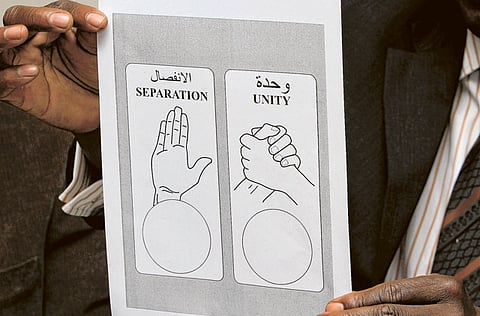Southern Sudanese register for independence poll
North and South agree on formation of soft border

Juba/Khartoum: Hundreds of south Sudanese people queued to register for their long-awaited independence referendum yesterday, which is their first concrete step towards a vote that could split Africa's largest country in two.
The move came as northern and southern leaders agreed they would form a ‘soft border' allowing the free movement of trade and nomads between their territories in the event of a separation, as part of a framework agreement to resolve a list of disputes between the two sides.
2005 peace deal
The referendum on whether the oil-producing region should declare independence will be held on January 9 and is the climax of a 2005 peace deal that has ended decades of north-south conflict — Africa's longest civil war, in which two million people died.
Analysts widely expect southerners, many of whom are embittered by the long war, to vote for secession.
Officials with megaphones walked the streets of the southern capital Juba yesterday morning, calling on the people to register. Queues built up in the city as some waited for southern president Salva Kiir to cast his vote and start the process.
One unofficial vehicle blared out the words of a pro-independence song: "It's the promised land and the promised land is coming".
The pro-independence mood has come at the same time as a campaign, led by Sudan's Khartoum-based president, Omar Al Bashir, calling for southerners to choose to stay united with the north.
Southern leaders have accused the north of trying to delay and disrupt the plebiscite to keep control of the south's oil reserves, and have warned there is a risk of a return to conflict.
Al Bashir has meanwhile dismissed the accusations and promised to accept the result of the referendum. "The country is facing a crucial stage of its history," the head of the referendum's organising commission, Mohammad Ebrahim Khalil, told reporters before registration started.
Registration centres
Khalil acknowledged that the commission had not done a good enough job in publicising the location of the registration centres. A day ahead of the vote lists of centres were available only on the commission's website and in schools, and many southerners have complained that they do not know where to register.
Southerners also will be able to register in the north and the eight countries outside Sudan.
The mood in Khartoum on Monday morning was subdued. No voters had turned up at one registration centre, just after the 8am deadline for the start of registration.
African Union mediators said northern and southern leaders signed a framework agreement on Sunday, setting out the terms of negotiations to resolve a list of disputes including how to share out oil revenues and national debt after a split.
In the agreement, both sides vowed not to return to war, to give people the right to choose their citizenship after a split and to start the demarcation of their disputed border immediately.
"In the event of secession, this will be the longest inter-state border in Africa ... The parties have committed themselves to maintaining a ‘soft-border', which will permit unhindered economic and social activity and interaction," read an AU statement.
It did not go into details on the location of the border, which is disputed, and said a bitter row over the ownership of the central oil-producing Abyei region still needed to be resolved.



